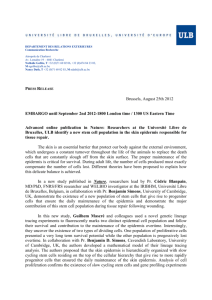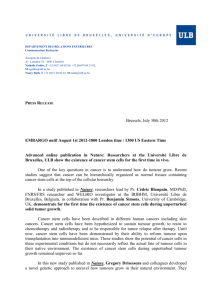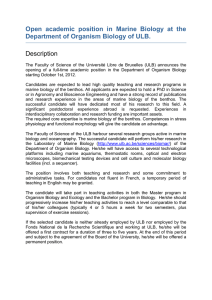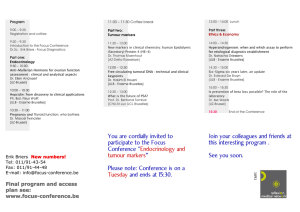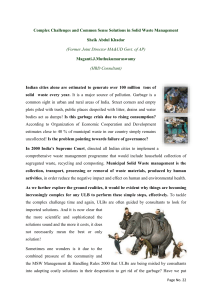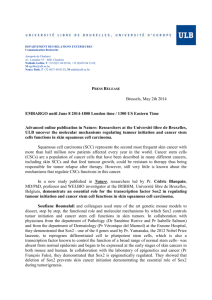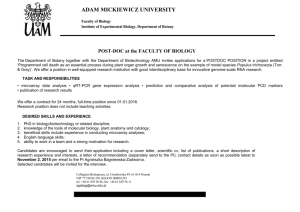DEPARTEMENT DES RELATIONS EXTERIEURES Communication
advertisement
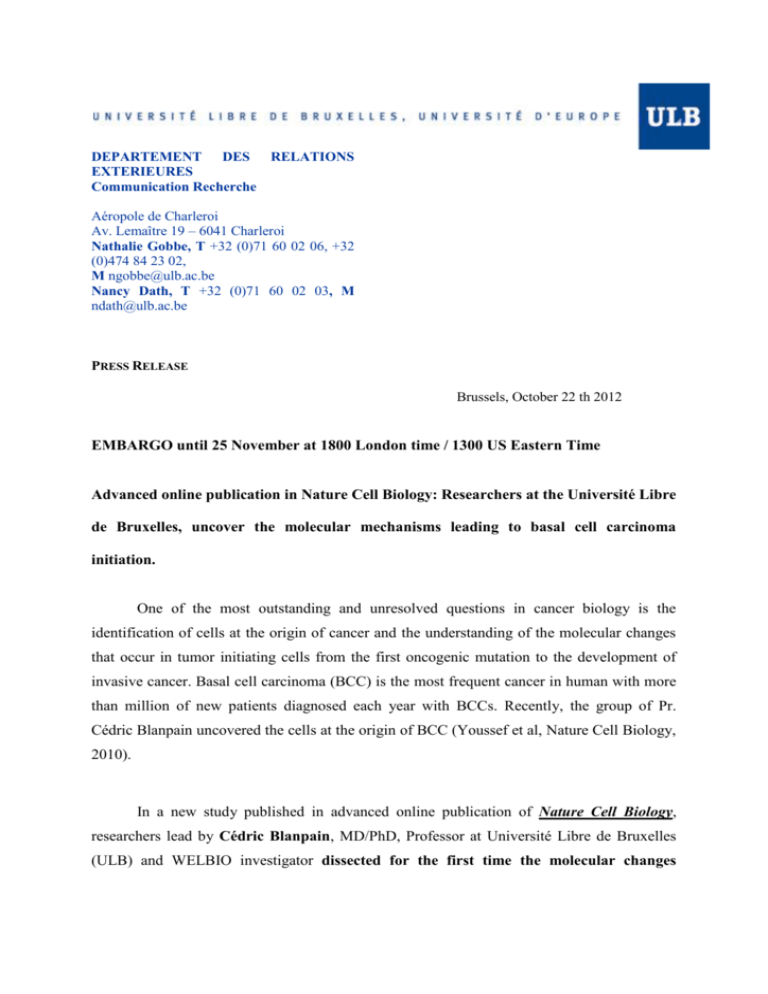
DEPARTEMENT DES EXTERIEURES Communication Recherche RELATIONS Aéropole de Charleroi Av. Lemaître 19 – 6041 Charleroi Nathalie Gobbe, T +32 (0)71 60 02 06, +32 (0)474 84 23 02, M ngobbe@ulb.ac.be Nancy Dath, T +32 (0)71 60 02 03, M ndath@ulb.ac.be PRESS RELEASE Brussels, October 22 th 2012 EMBARGO until 25 November at 1800 London time / 1300 US Eastern Time Advanced online publication in Nature Cell Biology: Researchers at the Université Libre de Bruxelles, uncover the molecular mechanisms leading to basal cell carcinoma initiation. One of the most outstanding and unresolved questions in cancer biology is the identification of cells at the origin of cancer and the understanding of the molecular changes that occur in tumor initiating cells from the first oncogenic mutation to the development of invasive cancer. Basal cell carcinoma (BCC) is the most frequent cancer in human with more than million of new patients diagnosed each year with BCCs. Recently, the group of Pr. Cédric Blanpain uncovered the cells at the origin of BCC (Youssef et al, Nature Cell Biology, 2010). In a new study published in advanced online publication of Nature Cell Biology, researchers lead by Cédric Blanpain, MD/PhD, Professor at Université Libre de Bruxelles (ULB) and WELBIO investigator dissected for the first time the molecular changes occurring in basal cell carcinoma initiating cells from the first oncogenic mutation until the development of invasive cancer. Khalil Kass Youssef and colleagues established the molecular signature of tumor initiating cells at different time during cancer initiation. They found that that cells at the origin of the basal cell carcinoma were progressively reprogrammed into embryonic hair follicle progenitor like fate before progressing into invasive carcinoma. “We were extremely surprised to see that tumor initiating cells were progressively and profoundly reprogram into a molecular identity that resemble to progenitor cells presented during embryonic development” comments Khalil Kass Youssef, the first author of this study. In collaboration with bioinformaticians from the ULB and the KUL, the researchers demonstrate that Wnt/β-catenin signaling pathway is activated in BCC-initiating cells soon after oncogene expression. Using genetic or pharmacologic inhibition of the Wnt/β-catenin signaling, the researchers demonstrate that Wnt/β-catenin signaling is essential for the reprograming of tumor initiating cells into embryonic hair follicle progenitors and for tumor initiation. In collaboration with physicians from the Department of Dermatology, Pathology and Plastic Surgery from the Hospital Erasme, the group of Cédric Blanpain demonstrate that human BCCs also present signs of reprograming into embryonic hair follicle progenitors and activation of the Wnt/β-catenin signaling, demonstrating the relevance of these findings for human patients. This new work is at the frontier of multiple fields of biology and medicine and will be extremely important for researchers studying cancer, development, and stem cell biology. “I am particularly excited about this work, because this basic research turn out to be very relevant for human diseases, with the identification of potentially new avenues to treat or to prevent the occurrence of the most common cancer in humans ” comments Pr Cédric Blanpain. This work was supported by the FNRS, the program d’excellence CIBLES of the Wallonia Region, a research grant from the Fondation Contre le Cancer, the fondation ULB, the Fond Yvonne Boël, and the fond Gaston Ithier, a starting grant of the European Research Council (ERC) and the EMBO Young Investigator Program. Khalil Kass Youssef, Gaëlle Lapouge, Karine Bouvrée, Sandrine Rorive, Sylvain Brohée, Ornella Appelstein, Jean-Christophe Larsimont, Vijayakumar Sukumaran, Bram Van de Sande, Doriana Pucci, Sophie Dekoninck, Jean-Valery Berthe, Stein Aerts, Isabelle Salmon, Véronique del Marmol & Cédric Blanpain. Adult interfollicular tumour-initiating cells are reprogrammed into an embryonic hair follicle progenitor-like fate during basal cell carcinoma initiation. Nature cell biology 2012, DOI: 10.1038/ncb2628 Journalists should seek to credit the relevant Nature Cell Biology publication as the source of stories covered Press Contacts: Cédric Blanpain, MD, PhD Professor of Stem Cell and Developmental Biology WELBIO, Interdisciplinary Research Institute (IRIBHM) Université Libre de Bruxelles (ULB) 808, route de Lennik, BatC, C6-130 1070 Bruxelles, Belgium Office: 32-2-555 4175 Lab: 32-2- 555 4190 FAX: 32-2 555 4655 Email: Cedric.Blanpain@ulb.ac.be Lab Website: http://blanpainlab.ulb.ac.be/index.htm
